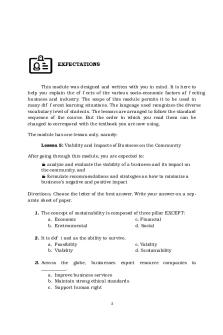Impacts of WW - aaa PDF

| Title | Impacts of WW - aaa |
|---|---|
| Author | Antor Podder 1721325 |
| Course | Introduction to Financial Accounting |
| Institution | North South University |
| Pages | 1 |
| File Size | 42.2 KB |
| File Type | |
| Total Downloads | 93 |
| Total Views | 148 |
Summary
aaa...
Description
1
Effects of WW I
The impact of the war was extraordinarily wide-ranging, which was not surprising given that it was the first 'total war' in history. This means that it involved not just armies and navies, but entire population, and it was the first big conflict between modern industrialized nations. New methods of warfare and new weapons were introduced — tanks, submarines, bombers, machine-guns, heavy artillery and mustard gas. With so many men away in the armed forces, women had to take their places in factories and in other jobs which had previously been carried out by men. In the Central Powers and in Russia, the civilian populations suffered severe hardships caused by the blockades. In all the European countries involved in the war, governments organized ordinary people as never before, so that the entire country was geared up to the war effect. The conflict caused a decline in Europe's prestige in the eyes of the rest of the world. The facts that the region which had been thought of as the center of civilization could have allowed itself to experience such appalling carnage and destruction was a sign of the beginning of the end of European domination of the rest of the world. The effects on individual countries were sometimes little short of traumatic: the empires wich had dominated central and eastern Europe for over two hundred years disappeared almost overnight. An attempt is made here to explain the effects of the war in a manner as brief as possible. (1)
The most striking effect of the war was the appalling death toll among the
armed forces. Germany (2 million), Russia (1.m million), France (over a million), Austria-Hungary (1 million), Britain ( 1 million), Turkey (325,000). Serbia (322,000), Romania (158,000), the USA (116,000), Bulgaria 49, 000) d Belgium (41,000). And this does not include those who were crippled by the war and civilian casualties. A sizeable proportion of an entire generation of young men had perished — the lost generation. France, for example, lost around 20% of men of military age. (2)
In Germany, hardship and defeat caused a revolution overthrowing Kaiser William
II and a republic was declared. Over the next few years, the Weimar Republic (as It became known) experienced severe economic, political and social problems. In 1933, it was brought to an end when Adolph Hitler became German Chancellor. (3)
The Austro-Hungary empire (the Habsburg Empire) collapsed completely. The
last emperor, Karl 1, was forced to abdicate (November 1918) and the various nationalities declared themselves independent. Austria and Hungary split into two separate states. (4)
In Russia, the pressure of war caused two revolutions in 1917. The first
revolution (February-March) overthrew the tsar, Nicholas 11, and the second (OctoberNovember) brought Lenion and the Bolsheviks (communists) to power....
Similar Free PDFs

Impacts of WW - aaa
- 1 Pages

Impacts of Exchange
- 3 Pages

Impacts of Suburbanisation
- 1 Pages

Aaa
- 2 Pages

Impacts of Major/Mega Events
- 6 Pages

Viability and Impacts of Business
- 12 Pages

Summer - aaa
- 1 Pages

AAA Diamond
- 4 Pages

Guia AAA
- 18 Pages

Toets ww. en nw - Opgave
- 1 Pages

Ch31 Impacts - Government Borrowing
- 18 Pages
Popular Institutions
- Tinajero National High School - Annex
- Politeknik Caltex Riau
- Yokohama City University
- SGT University
- University of Al-Qadisiyah
- Divine Word College of Vigan
- Techniek College Rotterdam
- Universidade de Santiago
- Universiti Teknologi MARA Cawangan Johor Kampus Pasir Gudang
- Poltekkes Kemenkes Yogyakarta
- Baguio City National High School
- Colegio san marcos
- preparatoria uno
- Centro de Bachillerato Tecnológico Industrial y de Servicios No. 107
- Dalian Maritime University
- Quang Trung Secondary School
- Colegio Tecnológico en Informática
- Corporación Regional de Educación Superior
- Grupo CEDVA
- Dar Al Uloom University
- Centro de Estudios Preuniversitarios de la Universidad Nacional de Ingeniería
- 上智大学
- Aakash International School, Nuna Majara
- San Felipe Neri Catholic School
- Kang Chiao International School - New Taipei City
- Misamis Occidental National High School
- Institución Educativa Escuela Normal Juan Ladrilleros
- Kolehiyo ng Pantukan
- Batanes State College
- Instituto Continental
- Sekolah Menengah Kejuruan Kesehatan Kaltara (Tarakan)
- Colegio de La Inmaculada Concepcion - Cebu




